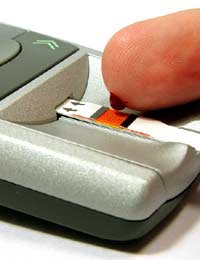Alcohol and Diabetes: How Strong is the Link?

Much research is currently being done on the relationship between excess alcohol consumption and a constellation of conditions that can trigger diabetes. The research is complicated by the fact that there are two kinds of diabetes to consider.
Type 1 Or Type 2 Diabetes?
Type 1 diabetes has previously been called juvenile or insulin-dependent diabetes – because it is commonly diagnosed when the person is a child or teenager. This form of diabetes means that the beta cells of the pancreas can no longer make insulin because the body’s own immune system has destroyed them. Treatment is a lifelong regime of insulin, possibly other drugs, managing diet, ensuring physical activity remains high and taking care over blood pressure and cholesterol levelsType 2 diabetes is also called adult-onset or non-insulin-dependent diabetes and it’s far more common. One mistake is to assume it only happens to adults, children can develop it too. The problem usually begins with insulin resistance in which the muscles and liver cells do not use insulin effectively and the pancreas responds to the increased demand by producing more insulin which leads to it being unable to secrete enough insulin. Treatment is similar to that for Type 1 diabetes but may not require insulin injections.
Alcohol And Diabetes Onset
According to the famous American Mayo Clinic, drinking excessive amounts of can lead to pancreatitis - a condition that damages the function of the pancreas, so it cannot secrete adequate amounts of insulin which can trigger type 2 diabetes. Chronic pancreatitis is one of the most common symptoms of extremely heavy drinking and it is estimated that one in three people in the USA who have chronic pancreatitis will go on to develop diabetes.Glucose Intolerance can be another symptom of alcohol consumption, it’s also seen in some binge and starve dieters. It’s a condition the body manufactures more insulin than it needs to digest sugars, leading to low blood sugar and eventual organ damage, which can cause Type 2 diabetes. Symptoms may include drowsiness, trouble concentrating after eating, feeling bloated after a meal, constantly hunger and the feeling of having ‘weak knees’ after a big meal.
Weight gain is a key feature of Type 2 diabetes – because being overweight is an overwhelming feature of diabetic tendency, and because alcohol is very high in calories, there’s a strong risk link between over-drinking and the onset of Type 2 diabetes. A single pint of beer may have as many calories as a bar of chocolate but while few of us would eat six bars of chocolate a day, many people consume that much alcohol without realising the potential side effects for long term illness.


Re: How Can I Talk to my Partner When he is Drunk?
Thank you BarbraL for recommending a guide by Ellen Petersen and sharing the link. I was completely…
Re: The Sale of Alcohol, Who Can Buy It, When and Where
My fiancé is an alcoholic, I have tried numerous times to prevent shops from selling her alcohol…
Re: How Can I Talk to my Partner When he is Drunk?
When dealing with any person who uses too much alcohol, understand that this person will hurt you and the…
Re: How Can I Talk to my Partner When he is Drunk?
When dealing with any person who uses too much alcohol, understand that this person will hurt you and the…
Re: How Can I Talk to my Partner When he is Drunk?
When dealing with any person who uses too much alcohol, understand that this person will hurt you and the…
Re: How Can I Talk to my Partner When he is Drunk?
When dealing with any person who uses too much alcohol, understand that this person will hurt you and the…
Re: A Brief History of Alcohol
What are your sources of information of this? I'm trying to write an essay but have no references for this information.
Re: The Sale of Alcohol, Who Can Buy It, When and Where
I feel utter despair. My son 52 has suffered with mental health for many years and 6 years ago…
Re: How Can I Talk to my Partner When he is Drunk?
I always imagined an alcoholic as a hammered guy, who piss his pants and get drunk every day. But my…
Re: How Can I Talk to my Partner When he is Drunk?
Hi. My partner has a drink problem. We argue about it all the time. I have wanted to kick him out but i…